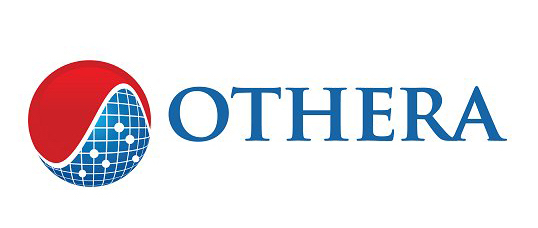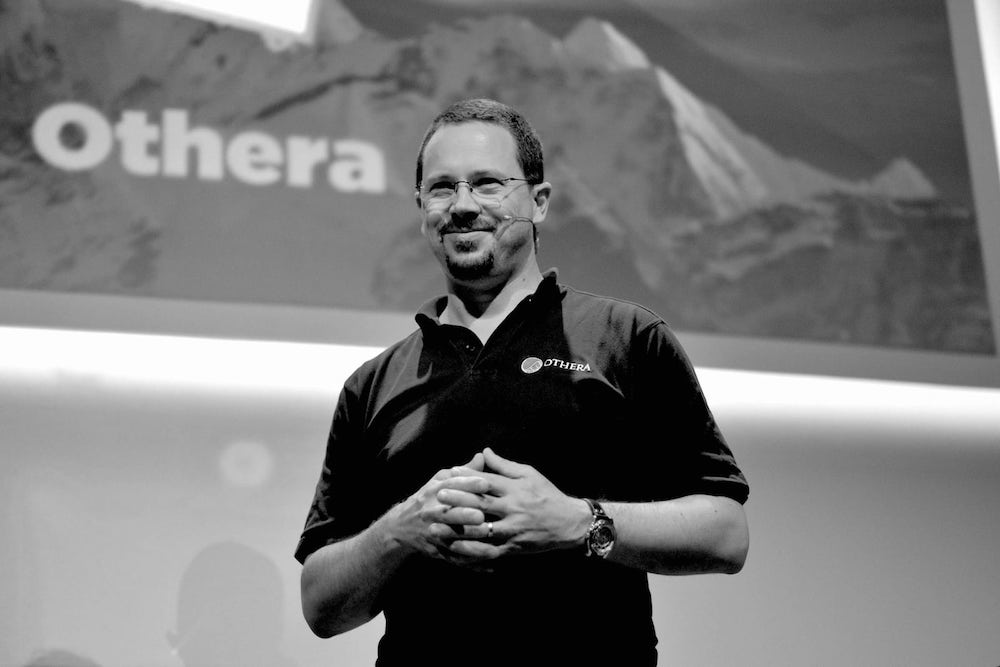(Editor’s note: This Globalists post on Othera is part of Dispatches’ Tech Tuesday series covering technology and global management. Our Globalists contributors are expat managers and entrepreneurs working in Europe, Asia and/or the Middle East. This post is courtesy of HighTechXL. It’s reposted here with permission. Read more about HighTechXL below.)
In Eindhoven, the trend for the past 20 years is for successful tech innovations to start as internal projects at multinationals such a Philips, then evolve into world-changing technology companies. Witness ASML, which has an 85-share in photolithography, and Shapeways, the 3D printing pioneer.
 The exception is Othera, which entered the HighTechXL accelerator in 2016 from Australia.
The exception is Othera, which entered the HighTechXL accelerator in 2016 from Australia.
Othera uses blockchain technology to match investors looking for higher-yield investments with vetted borrowers seeking capital.
Founder John Pellew had been in finance for years. So, in the Eindhoven Model, he just spun up from an environment where everyone was already using blockchain/distributed ledger technology, right?
“Absolutely not,” said Pellew in a recent interview from San Francisco.
Instead of advancing an existing project, Pellew started from scratch with a technology that barely existed, and most people still don’t understand – blockchain.
In this unorthodox gambit, Pellew came up with a startup management and team building approach that is wildly divergent from his decade as a banker and financial entrepreneur.

Instead of Othera being born from success, it came out of the ashes of an earlier startup that crashed in the Great Recession.
“One of the finance companies I had (in equipment leasing) I started 9 months before the global crisis,” said Pellew, a serial entrepreneur. “We went from startup to past the break-even point even in 9 months. That’s pretty damn fast.”
When the global financial meltdown hit in 2008, overnight there were no leasing companies to place the deals with.
When he started to examine why this happened, the core problem turned out to be lack of transparency and liquidity in financial products such as residential mortgage-backed securities. Millions of risky variable-rate mortgages were turned into securitized financial products, products rating agencies marked as “investment grade.”
After low teaser interest rates expired and double-digit rates kicked in, homeowners – many of whom had little or no income – were no longer able to pay. Those “investment grade” bonds were worthless, and the global economy collapsed.
How is this possible? Pellew asked. “And just as a hypothetical … I asked what could be done in the future to change the industry so this could never happen again?”
At the time, a Swedish friend “was talking about this thing called bitcoin,” which Pellew said he didn’t find all that interesting at the time.
But the underlying tech was interesting: distributed encrypted ledgers that store data including an audit trail of everything you’ve done. And the blocks are immutable … sequential, and nothing can be altered.
After reading a white paper on the blockchain platform Ethereum Project, Pellew started putting down the framework for a loan-origination software platform, with verified data that can’t be disputed in a court of law.
“All this extra capability they’ve built into the underlying technology for blockchain is the solution to my problem.”
The following Q&A was edited for length and continuity.
So how did you start to build Othera?
I started writing a framework of how to build a lending system … to capture all data and all records and then prove even the signing of the contract and cash draw – a totally provable record of events – that can’t be disputed in a court of law.
It just grew out from there. I was specifying and designing the functional needs – not the computer code part – the functional needs of this eco-system.
When it came to actually building the stuff, I went out and hired a development team.
I went to the second-ever Ethereum meetup group in Sydney. One of the speakers at the meetup group (was) Nick Addison. I said, ‘You seem to be the only one who knows anything about this. Would you be interested in building an MVP for me?” He said, “Yes I would … I just set up a software development job shop to help people do this.”
Over about 14 weeks, he and two other engineers built out the basis of our platform. After the development group (disbanded) that forced me to go out and find my own software engineers.
How did you know who you were looking for?
I had one guy who’d I had on my payroll for a year or so doing some other work in credit analytics for small businesses. So I said to him, “How do I go about recruiting people when I don’t know anything about software engineers?” He’d said he’d help check out resumes and code quality.
If they said, “I’m a Java developer,” I could say, “Send me something on Bitbucket that you’ve done,” and that proves the technical aspects of the resume.
On the other side, it’s much more about the philosophy of the candidate. It’s less about technical capability or what they’ve done in the past.
I’ve distilled the HR process to a few core mantra – the qualities to look for in people and how to get the best out of them.
While I’m looking at this industry gamble, I need blockchain (expertise), but there are no blockchain people because blockchain hadn’t existed before.
About that time, there were starting to be people putting their hands up saying, “I’m a blockchain expert.” I’m laughing (because) they’re trying to catch the unwary. They might have written a stock contract. They might have traded a bit of bitcoin. Are they really a blockchain “expert?”
Unlikely.
So I bypassed all those people and went back to look at what the core tech stack was likely to be.
When you really break it down, any enterprise Blockchain solution is only about 20 percent blockchain and 80 percent traditional tech stack: Java … and other stuff. There are plenty of those people who actually are experts; who’ve done five to seven years of hardcore development in those spaces.
Okay, there are a lot of those people … then what?
Then it comes down to the philosophy of the person you’re hiring.
In one defining word, I suppose it would be, “courage.” I call it courage under fire.
Why I say that is, you can go out and look for developers and software engineers from the space I come out of: ie, financial services and banks. That would be the logical place to start. The problem with that is they are beaten into submission to work within a very rigid framework, There is no creative latitude in what they … rigid boundaries to what is possible.
So they are the antithesis of who you’re looking for. You specifically don’t hire people from banks because … they have absolutely no aspirations to do something different and solve real problems.
This is courage part: When you’re hiring someone and I say, “Look, we’re doing Blockchain.” They say, “Ahhh, I don’t have any Blockchain experience.” I say, “Look, I don’t need you to have blockchain experience. What I need you to have is courage. And a desire to learn and explore. If you have the desire to learn and explore, I’ll give you the freedom to learn and explore.”
How do you quantify “courage” on a resume?
There are a lot of people who say, “I’ve got courage.” So I say, “Show me an example in your life when you can I say, ‘I showed courage.’ ” This is where it gets challenging for them. Because most of them can’t and they’re just talking bullshit. The ones who are really thinking about it actually can.
One of the very first hires … my CTO Connor said, “He’s skilled to death, but look, he’s not the right guy.” I said, “Well, he probably is the right guy because you said he’s the wrong guy.” The CTO was a banker guy I made the mistake in hiring. The (profile) I told myself never to hire.
I got this candidate – an Indian guy – in and said to him, “I can’t tell if you’re a good developer or bad developer. What I want to talk to you about is how you got here to Australia. Tell me your story.” He was working in an IT job shop, solving peoples’ problems.
His story was quite amazing. He spent a number of years working for Oracle in India. He was given the opportunity to go to Africa to do an implementation of software with a small team at a small bank in Zambia. He put his hand up and said, “I’ll go!”
Indians in Africa are second-class citizens, so it’s a hard world to live in. He went and ended up staying five years and he said, “It was the best time of my life.” I personally wouldn’t do that. So I’m sitting there benchmarking against what I would do and I’m thinking that’s showing a lot of courage.
I said to him, “I’m quite interested, but what I’m really looking for is this thing I call courage under fire. We’re building something that’s never been done before. We’re about to build software that’s never been built before and I need to know if you can stick it out and solve the problems at all costs.
“When the bullets are flying and in you’re in trench warfare, you keep on pushing to solve the problems and you’re not letting go”
He said he could and he would and … now he’s our software development lead. He’s literally the backbone of the business because of the strength of character and his quiet leadership. He’s been quite amazing.
It sounds like you’re looking for people who can thrive in an environment of uncertainty.
I put it into context for them. I say, “You’re building something no one has ever built before. Do you think someone built the automobile or the plan the first time they tried? Of course not. They spent years of failing ….” You have to have the courage under fire to keep pushing. When you do, you should have pride in what you achieved. You’re changing the world.
I look for the outliers in the statistical sample of life.The people I want are at both ends of the spectrum. The 5-to-1 percent on either side of the bell curve. These are generally the people who are disenfranchised working in big organizations. Their personalities don’t feed into the core machine. They’re not robots. They don’t do what they’re told.
Or they have personality defects that make them hard work with. They’re quirky. I look for them. When you give these people a chance and give them an environment that supports their quirkiness, they really thrive.
What you find out is when you put all these quirky personalities in a room together is, guess what. They’re all outliers. Suddenly the normie who works in the bank is now the outlier and he doesn’t fit in. And he’s not the one we want, anyway. While all the outliers are tough to deal with in the working environment, you put them in a room together, you can’t believe how well they along. Because they say to each other, “You’re as bonkers as I am!”
What you’re doing is, you’re getting what I call “cognitive diversity.” You need to get as many diverse thought processes as possible. These people on the fringes are radically different in the ways they approach and solve problems.
This is why we’ve been able to move forward so quickly. They’re, not bounded by traditional methodologies. We don’t give shit what has gone on before. We’re here to build something new. That’s why I’ve become more comfortable with the fact our big competitors like the IBMs of the world who’ve got 500 people – 500 software engineers – working on blockchain will never catch us. They’ve got 500 normies recruited out of banks. They’re technologists trying to solve the problem from the technology up.
We develop technology from the problem down.
If you’re giving your team total latitude, what exactly do you do? What is your role?
This is now my third major startup, and I’ve boiled my role down literally to two functions – strategy and resourcing.
It’s my job to define what we’re doing, build the plan, articulate the plan to the troops and let them get on with it.
Resourcing means bringing every resource to the business so people can do their jobs – money people infrastructure, tech whatever it is.
In a startup, you have to do everything. But as the business grows, you have to pass off the ancillary functions to other people. If you have any personality traits that make you micromanager, you will not survive and you will not achieve greatness. You get bogged down in the nitty-gritty of the jobs you can’t let go.
I have a mantra: “self-serve, self-solve.” I employ you to do a job, you have to sort out how to deliver it. You’re smart people. You’re smarter people than me. Go away and solve the problem And by the way, you have total latitude to do what is required to get the job done with no interference from me.
In a big job shop, what you have is people coding away and they hit a wall. They go to the boss and say, “What do you want me to do here? A? B? or C?” The boss would have to solve the developer’s problem and make a decision. So basically, every time you hit the way, the work stops.
You can’t have that in a high-speed startup!!! Everybody has to be empowered to keep the project moving forward without asking the boss.
This is where courage comes in. They have to have the courage of their own conviction. They have to have the courage to be wrong. If they’re wrong, that’s okay. They just have to fix it and find another way of getting the job done.
If I have to manage your time. If I have to micromanage you … that’s not my job. It’s forcing me to do bad behavior against the things I believe in. Therefore, I don’t need you.
It sounds very harsh, but it’s just the reality of startups.
About Othera:
Othera is an Australian financial technology company based in Sydney that launched in 2015. Othera software incorporates two tools for loan originators:
• Its Blockchain Lending Platform llows lenders to digitize, segment and price whole or partial loans and convert them into digital loan tokens.
• Its Digital Asset Exchange enables trading digital loan tokens between loan originators and investors. The exchange helps lenders to recapitalize their balance sheet and provides investors with means for analyzing credit risk and an opportunity to invest in fixed income digital assets.
About HighTechXL:
Founders of the HighTechXL hardware accelerator in Eindhoven believe innovation is an answer to the grand challenges of the world, and that everyone with a great idea should be empowered to make a positive impact.
HighTechXL was founded in Eindhoven, a region focused on R&D and high tech business, and where the normal accelerator model would not cut it for the hardware startups. Partnering with the big companies in the region, Guus Frericks and his team developed a 3-month acceleration program specialized to support hardware startups to go from prototype to market.
Co-CEO of Dispatches Europe. A former military reporter, I'm a serial expat who has lived in France, Turkey, Germany and the Netherlands.















